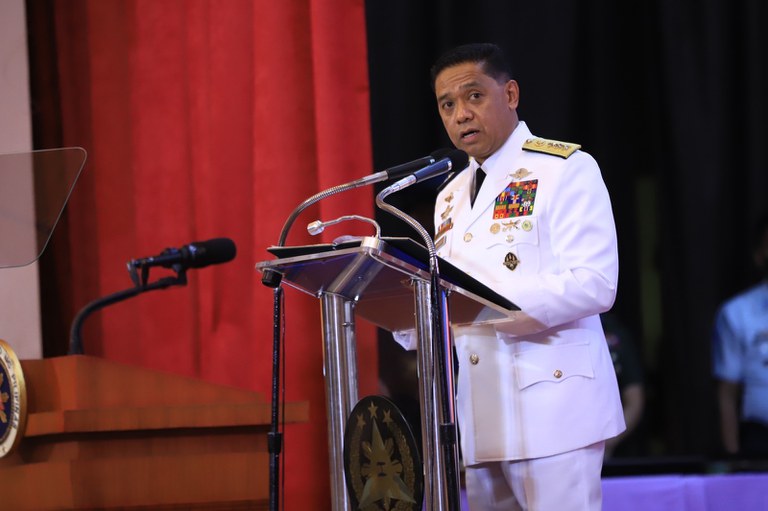New Philippine military chief calls for protecting sovereignty ‘at all costs’
2023.07.21
Manila
 Lt. Gen. Romeo Brawner Jr., the new Philippine military chief, receives the ceremonial saber from President Ferdinand Marcos Jr. (right) as outgoing commanding general Andres Centino stands in the background during a change-of-command ceremony at the Armed Forces of the Philippines headquarters in Manila, July 21, 2023.
Lt. Gen. Romeo Brawner Jr., the new Philippine military chief, receives the ceremonial saber from President Ferdinand Marcos Jr. (right) as outgoing commanding general Andres Centino stands in the background during a change-of-command ceremony at the Armed Forces of the Philippines headquarters in Manila, July 21, 2023.
The Philippines’ new military chief assumed his post Friday with a call to protect the country’s territory “at all costs,” as he pledged to modernize the armed forces amid challenges by China in the South China Sea.
Lt. Gen. Romeo Brawner Jr. took the helm of the Armed Forces of the Philippines (AFP) against the backdrop of growing tensions with Beijing in the contested sea region, including Chinese ships encroaching on territories in waters within the Philippines’ exclusive economic zone.
“Our mission is to ensure that this administration is successful in governing our nation, in securing our peace and in protecting our territory at all costs,” Brawner, a 55-year-old army officer, said during his induction ceremony in Manila.
He takes command of the country’s 150,000-strong armed forces, complemented by 70,000 members of the Citizen Armed Force Geographical Unit (CAFGU) and more than 1 million reservists.
“In line with the president’s pronouncement of not giving an inch of our territory, the AFP will endeavor to modernize its personnel, equipment, facilities, processes and systems so as to enable it to [become] a lethal and competent fighting force capable of defending our territory from external aggression,” Brawner said.
Part of that would be actively pursuing “international defense and security engagements to strengthen our relations with our allies and partners,” he said without elaborating. Under his command, the AFP would also actively participate in U.N. peacekeeping missions, he said.
The Philippines has received active support from allies that include the United States, Australia, the United Kingdom, and Japan. All these countries have called on China to respect a 2016 international arbitration ruling in favor of the Philippines that rejected Beijing’s claims to most of the South China Sea.
China has never accepted the verdict, but legal experts have said it set international jurisprudence on how to deal with contending claims in the strategic waterway.
China claims nearly the entire South China Sea, including waters within the exclusive economic zones of Brunei, Malaysia, the Philippines, Vietnam and Taiwan. While Indonesia does not regard itself as a party to the South China Sea dispute, Beijing claims historic rights to parts of that sea overlapping Indonesia’s EEZ as well.
In a move that angered China early this year, Manila granted the United States expanded access to its military bases, an agreement seen by analysts here as central to Washington’s aim of deterring any plan by Beijing to attack Taiwan. The Philippines also allowed large-scale joint exercises with U.S. troops in areas that face Taiwan.
President Ferdinand Marcos Jr., who spoke at Friday’s induction, urged Brawner to “recalibrate the country’s internal security operation” to deliver public services in remote and disadvantaged communities.
“I have faith that under the supervision of General Brawner, the Armed Forces will continue to ensure the security of the Filipinos and the sovereignty of our country amid the challenges ahead,” Marcos said.
Defense Department spokesman Arsenio Andolong said Brawner was an “excellent choice” to lead the Philippine military at a critical juncture when the country faces challenges from China. Brawner’s predecessor, Gen. Andres Centino, has been appointed by Marcos as his adviser on issues to do with the South China Sea.
“We are confident that Lt. Gen. Brawner will continue to exemplify excellence, innovation, and professionalism as he leads the AFP,” Andolong said.

Meanwhile, maritime law analyst Jay Batongbacal urged the government to act swiftly on the Maritime Zones Bill and certify it as priority legislation, noting that the legislation would guide the country’s military and law enforcement agencies that operate in the sea.
The measure, which has been adopted in the lower house of Congress, provides for a general declaration of the maritime zones under the jurisdiction of the Philippines.
These include internal waterways, archipelagic waters, territorial seas, contiguous zones, the exclusive economic zone (EEZ) and continental shelf. The proposed law allows the delineation of continental shelves extending beyond 200 nautical miles, in accordance with the United Nations Convention on the Law of the Sea (UNCLOS).
It also clearly provides for sovereign rights over these maritime zones, thereby clearly establishing the Philippines’ exclusive rights to explore and exploit living and nonliving resources found in these zones.
“If you enable the government to delineate and define the zones in appropriate maps and the corresponding accuracy, we can have a very good, very clear idea of what it is that we are trying to preserve, what it is we are trying to manage and what it is that we will not be giving up,” Batongbacal told a forum on the South China Sea on Wednesday.
“This will naturally enable the more effective monitoring, control, surveillance, management of all of our marine waters and marine resources that will be found therein,” said Batongbacal, director of the Institute for Maritime Affairs and Law of the Sea at the University of the Philippines.
“By doing so, we would actually be taking a step to implement and enforce the SCS [South China Sea] Arbitration Award, which we won in 2016,” Batongbacal stressed.
Jeoffrey Maitem and Jojo Riñoza in Manila contributed to this report.







